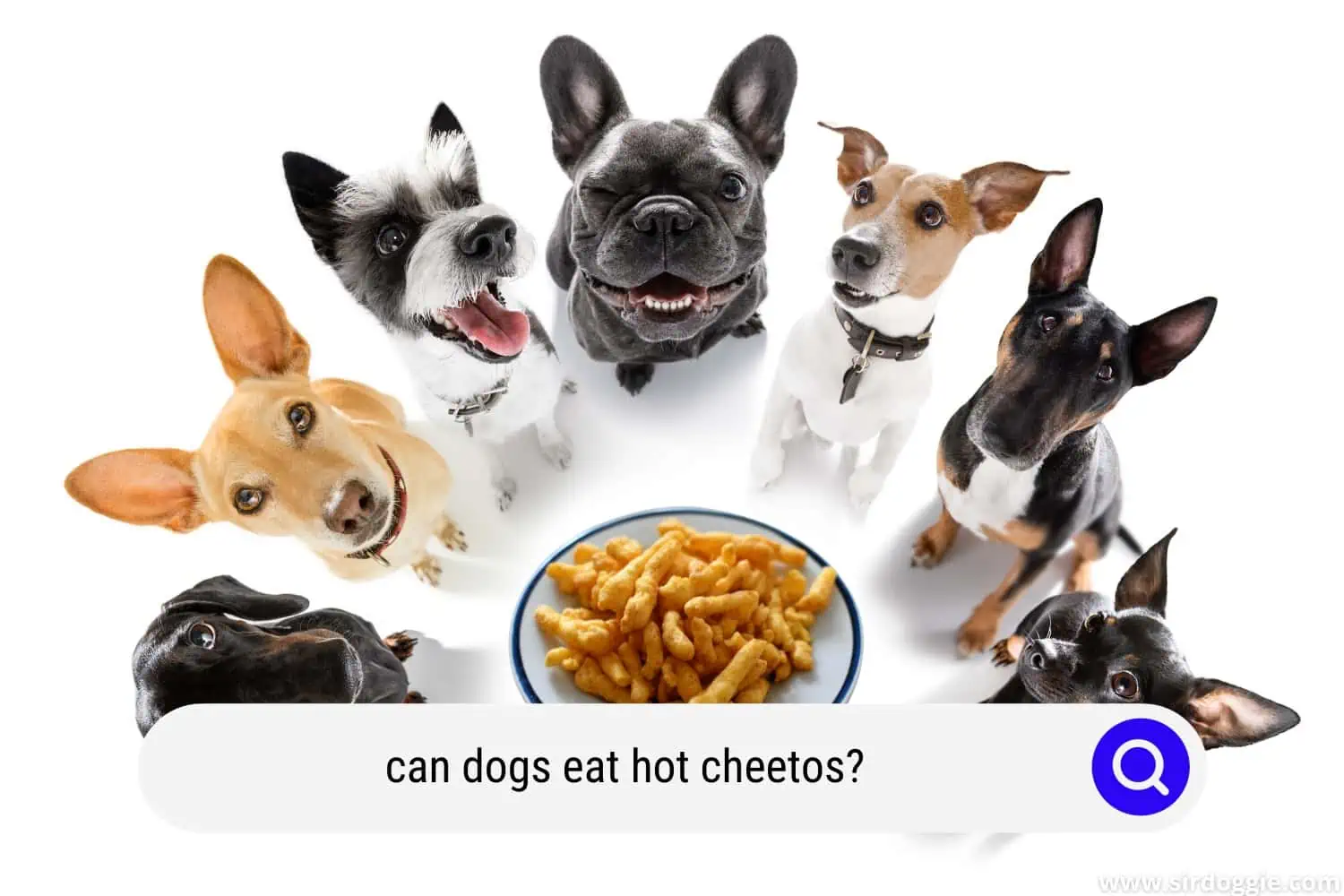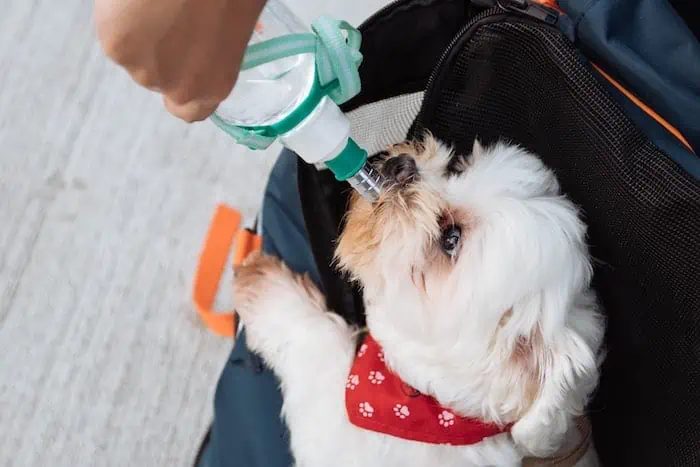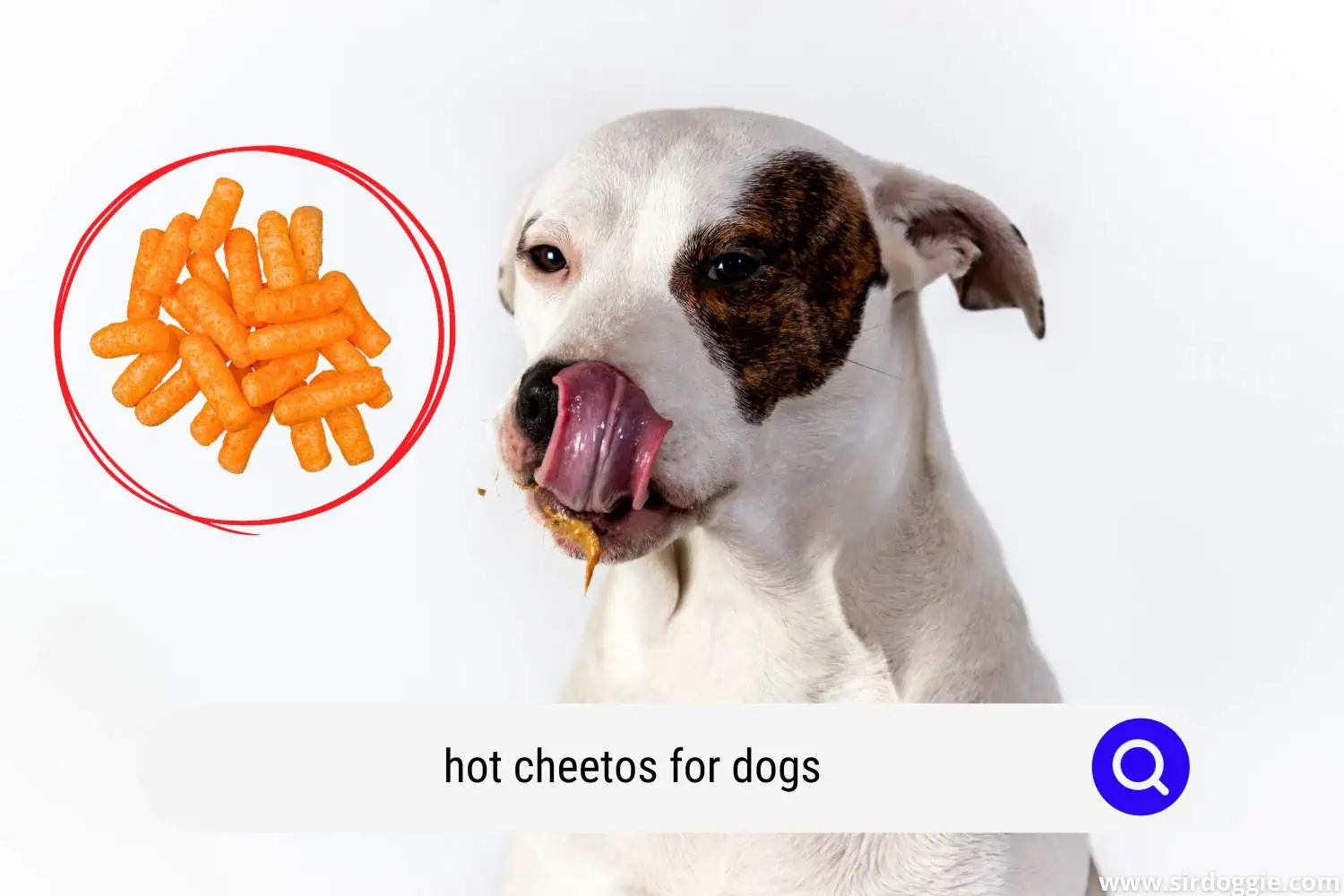Can Dogs Eat Hot Cheetos? Read This First!
It’s all too easy to toss a snack to a pet dog, especially after he or she sits quietly and patiently watching you chomp away. However, doing this can be quite unhealthy for your pooch, especially snacks loaded with preservatives or who knows what other chemicals are added for flavor kicks.

Take for instance a quite popular bagged snack, Flamin’ Hot Cheetos. Can dogs eat Hot Cheetos? Dogs can eat them, or other types of spicy chips, on occasion, but it’s not a good idea to let it happen often. The main reason is the typically large amount of sodium, additives, and other ingredients in these snacks really designed for humans.
Dehydration is a serious threat for dogs, even more so than with humans as we can cognitively acknowledge it and seek help quickly if needed. Dogs ingesting too much sodium over time may require a lot more water than you’ve been providing. Salts in snacks like Cheetos can sneak up on a pet owner.
Additionally, all those additives that are known to be unhealthy for us are also not healthy at all for canines. One ingredient, in particular, garlic powder, is especially harmful to canines.
Let’s explore the cheesy-puffed snack item, and what they’re made of, and consider what it can mean for your pooch both immediately and in the long haul.
Reasons to Avoid Feeding Cheetos to Your Dog
The list of reasons to keep Hot Cheetos from your dog is long. Let’s start with those posing the greatest risks to the health of your pet:
- Salt. While all mammals need at least some sodium, too much can be very problematic and lead to hypertension, and, as noted above, dehydration which brings its own set of troubles.
- Garlic powder. This one is specific to canines. Hot Cheetos, including the Crunchy Flamin’ Hot variety, contain this ingredient which is actually toxic to dogs. The powder contains thiosulfate, which can cause significant damage to red blood cells, and possibly lead to a troublesome type of anemia.
- Fat. The high-fat content in Hot Cheetos (11 grams in each 21-piece serving of Flamin’ Hots) can contribute to heart disease, hypertension, diabetes, and other ailments.
- Oils. Hot Cheetos are made with vegetable oils, which have been known to cause discomfort in dogs.
- Additives. As with many American junk food items, Hot Cheetos contain Monosodium Glutamate, often referred to as simply MSG, which some believe can cause brain damage in dogs, among other health problems.
- Too spicy. In general, very spicy foods like hot peppers are troublesome for dogs and cause problems similar to what happens to us when we overdo the hot-ness.
Some say Hot Cheetos are simply too difficult for a dog to digest, possibly from the cornmeal base in its composition. There also are sugars, not always healthy for canines, buttermilk, and artificial colors which can alarm a dog’s owner when a stool comes out colored red.
The very high salt content is bad for digestion but also can contribute to a number of health problems for your dog including hypertension, diabetes, arthritis, and even stroke.
What Happens if a Dog Eats Hot Cheetos?
If a dog eats one or two Hot Cheetos, or maybe even a handful, at one time it’s not cause for alarm. This is not an instantaneously life-threatening situation. It could, however, become uncomfortable for both you and your dog.
If you know your dog has eaten some Hot Cheetos, the main thing to do is watch them carefully for any changes in their typical behavior. Surprising whining, or maybe being very lethargic, may be warning signs.
Secondly, and again noting the importance of hydration for dogs, offer them as much water as they can take, and make water plentiful throughout their environment.
Remember, Cheetos are not considered poisonous. They are just widely viewed as unhealthy for canines, especially if ingested in large quantities, or over a prolonged period of time.
Over-exposure to toxins, or bodily chemical imbalances caused by malnutrition, may not be noticed right away in any dog. However, over time these dietary problems could contribute to disease including cancer, or even failure of organs or bodily functions in your dog.
Specific Dog Reactions to Hot Cheetos
There are a few things you probably can expect if your dog eats too many Hot Cheetos, among them:
- Excess gas. Beware that this might be coming; it might be a good time to keep your pooch outside for a spell.
- General discomfort. Your dog may pace more or do things they generally do when nervous if they are uncomfortable with how they feel inside.
- Nausea ~ watch for dry heaves, or unusual colors or expressions on its face. A dog’s eyes can reveal much when it is not feeling well.
- Vomiting.
- Diarrhea.
How to Tell if Your Dog is Dehydrated

The most common way to determine if a dog is dehydrated is to test its skin for elasticity. That is, gently grab the dog’s skin between the shoulder blades, carefully pull up an inch or two, and then just let it go. The skin of hydrated dogs will easily slide back to its original position. It’s an indication of your dog’s health overall.
If the raised skin is slow to return to the normal position ~ like it gets stuck in the raised position ~ your canine may be dehydrated. Other signs of dehydration in dogs:
- Dry or sticky gums, and/or thick saliva (this is probably the second-most common way to check for dehydration)
- Changed appetite pattern, or loss of appetite entirely
- Vomiting
- Lethargy
- Overly panting
- Dry-looking, even sunken, eyes
- Dry nose
It’s a solid idea to test your dog’s skin (between the shoulder blades) while you know he or she is healthy and hydrated ~ to set a baseline for what normal looks like. It’s a neat health quick-check, like touching its nose for coldness.
Healthy Snacks for Your Dog
Like humans, dogs are omnivores, meaning they depend on meats as well as fruits and vegetables for their nutritional needs. Commercial dog foods are designed to meet a dog’s basic needs, but, again just like us, dogs can tend to get bored with the same foods over and over. It’s also helpful to try to introduce variety in your pet’s diet at least now and then.
Think about the omnivore part. There’s nothing wrong with tossing an apple out into the backyard, or slices of an apple into a food dish. (Just remember to remove the seeds, as they contain a form of poisonous cyanide).
Other healthy snacks are other fruits or vegetables: bananas, carrots, green beans, and even pumpkin or strawberries contain a lot of vitamins and nutrients that are very beneficial to dogs.
Apples in particular are high in vitamins A and C, known antioxidants. They also help keep your dog’s teeth healthier and his or her breath fresh. With green beans, or any type of vegetable really, aim for fresh green beans and skip the canned variety which often contains too much salt.
If it’s treats you want, think of non-food treats like bones or leather toys for them to chew on. Sometimes dogs are much like us when snacking: it’s not necessarily from hunger, but sometimes just to kill time or ease anxiety. We all just need to be aware of the harmful health impacts of snacking too much.
Is There Any Nutritional Value in Cheetos?
There is very, very little health-related value to eating Cheetos, whether it’s a dog, human being, or any other type of animal doing the ingesting. Just 21 individual pieces of the crunchy snack puffs have 150 calories, along with plenty of the less-healthy types of fats, and a whopping 250 mg of sodium.
Cheetos have slight traces of fiber or micronutrients, only 1 gram of protein in every 21 pieces, plus a touch of iron. The value for humans is in the flavor, making it a leisure-based food item. Dogs might need a comfort snack at times, but there are much, much better alternatives.
You should be in the habit of reading the “Nutrition Facts” box on all the food items you ingest. There’s no reason why you shouldn’t also know what’s in any food item given to your pet. Always take notice of sodium content, if anything.

Final Words on Hot Cheetos and Dogs
Flamin’ Hot Cheetos contain plenty of ingredients that can harm your canine, whether within hours or long term. Primarily of concern is the salt content in the cheesy puff snacks, and the use of garlic powder, both especially harmful to a dog’s physical structure.
The potential for general gastrointestinal distress alone should make you wary. Eating Hot Cheetos once won’t kill your dog. But it’s not a good idea to provide them for a dog to eat regularly.
The American Veterinary Medical Association reports that half of our pets will have to visit a veterinarian for a health problem related to food. While you might not be able to stop a pooch from sneaking a hot Cheeto or two, purposely providing spicy snacks to your pet is ill-advised. The potential side effects or long-term harm are too significant.

Family Dog Expert Author
Hi there! I’m Stuart, a devoted dog lover and family dog expert with over a decade of experience working with our furry companions. My passion for dogs drives me to share my knowledge and expertise, helping families build strong, loving bonds with their four-legged friends. When I’m not writing for SirDoggie, you’ll find me hiking, playing with my beautiful dog, or studying music.
